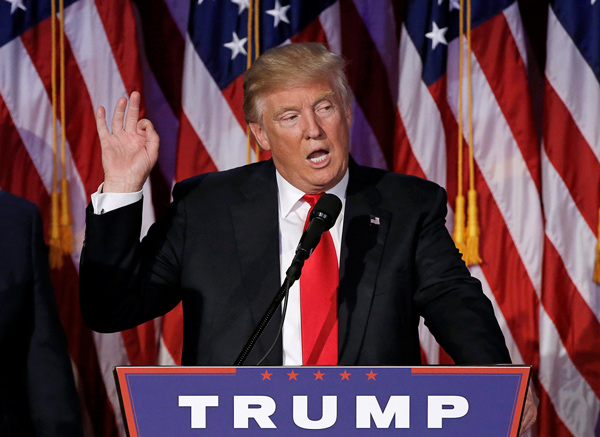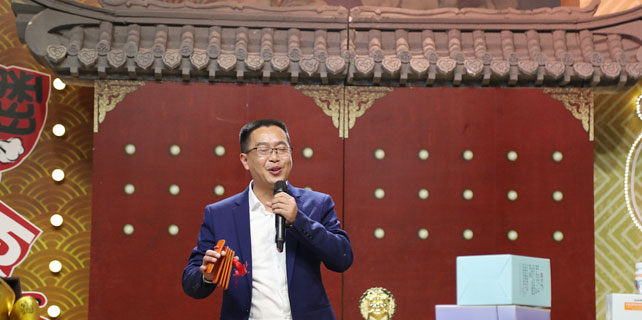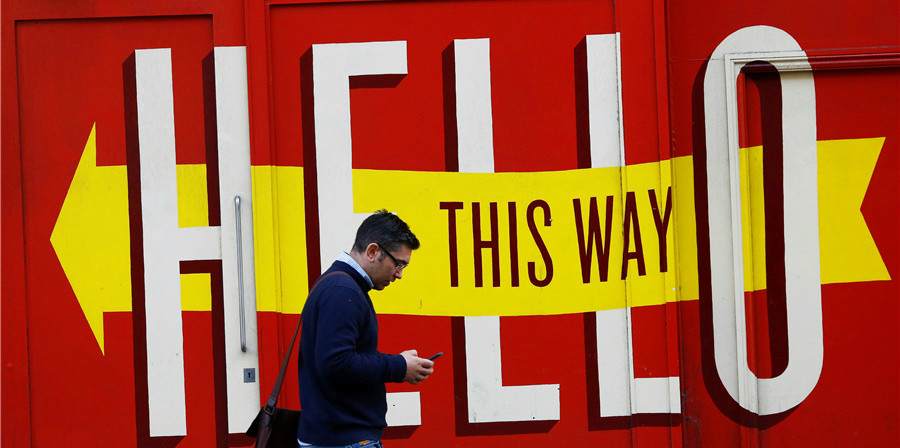Is Trump the savior for US working class?
 |
|
US President-elect Donald Trump speaks at election night rally in Manhattan, New York, US, November 9, 2016. [Photo/Agencies] |
In January, Donald Trump will be sworn in as the 45th president of the United States. Despite his unpredictability so far, his performance in governing might be a bit easier to speculate on. And for his voters who are eager to see him delivering on his promises, disappointment may be in store.
Riding the high tide of populism to victory, Trump tapped into the anger and resentment of a growing number of disfranchised American white working class. When US manufacturing enjoyed comparative advantage worldwide, trade deals good for American business were also good for American workers. But increasingly outsourcing and off-shoring have allowed transnational capital to move freely around the globe in search of better returns. The promised better and higher paying jobs as a result of globalization and trade liberalization do pop up, but they rarely trickle down to the millions of blue-collar workers in the US' Rust Belt states. The annual American Values Survey of 4,500 Americans finds that nearly half of them no longer believe in the American Dream.
In comes the self-appointed "greatest jobs president", promising a sweeping shake-up to revitalize US manufacturing, create new jobs, rebuild infrastructure and change domestic regulations. In keeping with these inward-looking objectives, Trump has also promised to renegotiate trade and alliance deals and tighten border control. Which explains why many of those people voted Trump on election day.
But will Trump be their savior? The truth is, Trump's "America First" agenda is easier said than done. For a start, which America should come first now that America remains bitterly divided? Despite some cautious optimism, uniting the country alone would be an uphill battle for the incoming Trump administration, not least because Trump himself has fanned the flames of hatred and xenophobia. Although he pledged to be "president for all Americans" in his acceptance speech, a quick glance at his tax plan, for instance, suggests otherwise. Despite his campaign pledge to provide tax relief for "the middle class" and "the forgotten people", his tax cuts overwhelmingly favor the wealthiest few.
Also, it is extremely difficult for the Trump administration to implement the reforms he has promised while trying to wall off his country with protectionist measures. For example, the disappearance of US manufacturing jobs, and indeed many such jobs worldwide, is largely due to technological advances and automation. No amount of punitive tariff on Chinese or Mexican imports would likely bring the lost jobs back soon.
If Trump does follow through on his tariff threats, the prices of many imports will go up and a trade war may ensue. And transnational corporations are likely to put up a good fight against Trump's measures that would add costs to their businesses and eat into their profits.
His aspiration to rebuild US infrastructure is laudable, but he may quickly realize that such a gigantic task needs to heavily rely on foreign finance and materials, such as from China, the very target of his 45 percent tariff threat. In 2013, the New York Metropolitan Transportation Authority outsourced $34 million worth of steel to China for the upper deck replacement of the Verrazano-Narrows Bridge. Answering critics, MTA Chairman Thomas Prendergast blamed an "absence of domestic steel fabricators capable of satisfying the requirements for a project of this scope and complexity". With such challenges, one wonders how Trump will balance the practical needs of his massive infrastructure plan and his staunch mercantilist stance, let alone how he will finance his trillion-dollar plan with massive tax cuts.
The president-elect may have correctly sensed some of the American (and to some extent, global) ills, but he does not have the necessary cures for them. So, together with his backflips on prosecuting Democratic presidential candidate Hillary Clinton, building a wall on the US-Mexico border, and climate change, even the most erratic US president might turn out to be a lot more conventional than he appears to be. Soon enough his working class supporters will find out that Trump's America will not be a working class paradise.
The author is senior lecturer in international relations at Deakin University, Australia, and is currently an Endeavour Research Fellow at Peking University. The views expressed here are his own.
- Trump's team says Iowa Governor Branstad to be next US ambassador to China
- Trump's irrational China bashing shows his ignorance of China
- History should serve as mirror for Trump in China-US ties
- Wait-and-see approach urged on ties after Trump's Twitter remarks
- Trump business approach finds support
- Will Trump walk the talk on his vow to drain the swamp?









